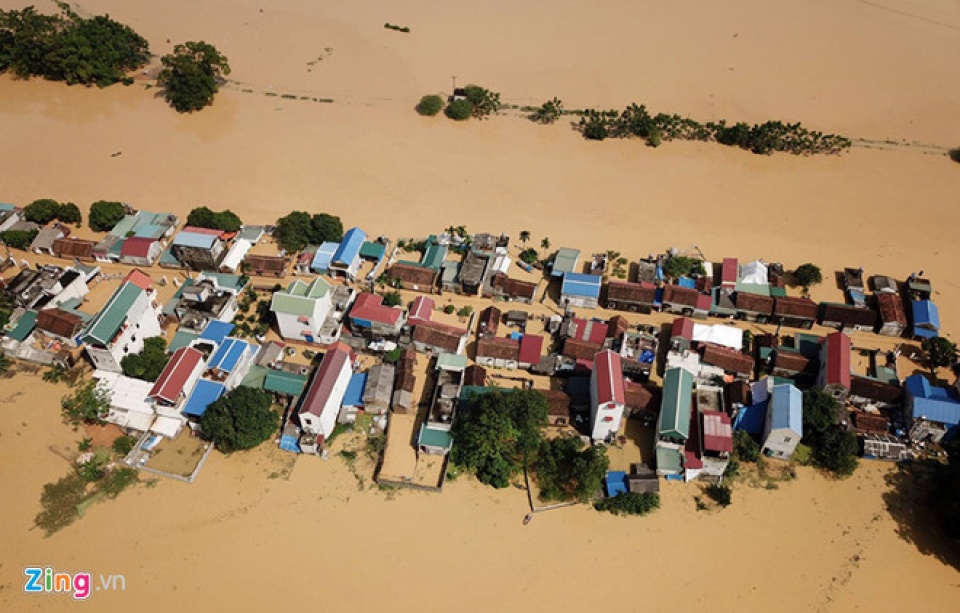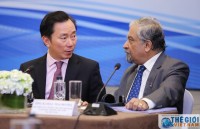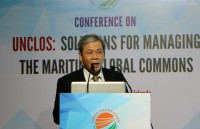
Asia-Pacific countries boost disaster resilience efforts at regional UN meeting
Latest
| TIN LIÊN QUAN | |
| Vietnam represented at int’l travel market in Ukraine | |
| Conference talks UNCLOS’s role in managing marine global commons | |
Convened by the United Nations Economic and Social Commission for Asia and the Pacific (ESCAP), the week of expert meetings and side-events culminated in the ESCAP Committee on Disaster Risk Reduction, held from 10 to 12 October, which brought together senior government officials and experts from 31 countries to discuss how to make the region more resilient to disasters.
 |
| Bui Xa village, Chuong My district, Ha Noi suffered from the recent flood. |
The meeting was held against the backdrop of the continued, severe impact of natural disasters. In recent months, the region has seen Typhoon Hato unleash large scale damage in Hong Kong, and Macau, that stretched all the way to Vietnam, along with torrential monsoon rains in Bangladesh, India and Nepal that claimed more than 900 lives and affected another 41 million people.
“Over the last three days, the Committee covered a wide spectrum of issues that point to intensifying risk scenarios that are evolving dynamically in the region,” said United Nations Under-Secretary-General and Executive Secretary of ESCAP Dr. Shamshad Akhtar at the closing ceremony today.
“Against this complexity, two concluding points are clear. One is that as the most disaster-impacted region of the world, disaster risk is outpacing resilience. Two, regional cooperation is the way forward. As disasters know no borders, vulnerabilities are shared and actions taken on a regionally cooperative basis, augment impacts.”
Countries in the region agreed to establish the Asia-Pacific Disaster Resilience Network to strengthen ESCAP’s work on coherence for disaster risk reduction and resilience across the 2030 Agenda for Sustainable Development, and ESCAP’s Regional Roadmap on implementation of the SDGs.
The Network will integrate ESCAP’s analytical, norm setting and capacity development work as increasingly complex linkages emerge between disasters, climate extremes, poverty and conflicts.
It will also facilitate collaboration and partnership among key stakeholders, including the Asia-Pacific Regional Coordination Mechanism and the Thematic Working Group on Disaster Risk Reduction and Resilience.
The Committee noted that the ESCAP Multi-Donor Trust Fund for Tsunami, Disaster and Climate Preparedness in Indian Ocean and Southeast Asian Countries, had contributed to people-centred multi-hazard early warning systems in the Indian Ocean rim countries and requested continued support to ensure operability of the systems.
It also welcomed the imminent physical establishment of the Asian and Pacific Centre for the Development of Disaster Information Management (APDIM) in Tehran in January 2018, and expressed support for a new Asia-Plan of Action for Space Applications which will present a blueprint for regional cooperation in realizing the potential contributions of space derived data and knowledge to sustainable development.
 | Vietnam withdraws run for UNESCO Director General position Vietnam has withdrawn from the race for the UNESCO Director General position before the third round of voting. |
 | Conference talks UNCLOS’s role in managing marine global commons A conference on the United Nations Convention on the Law of the Sea (UNCLOS) is being held in Port Blair, Andaman and Nicobar Islands of ... |
 | UNFPA helps Vietnam in data use for plan, goal implementation The United Nations Population Fund (UNFPA) is going to assist Vietnamese agencies to collect and use high-quality data to serve the implementation of development plans ... |












